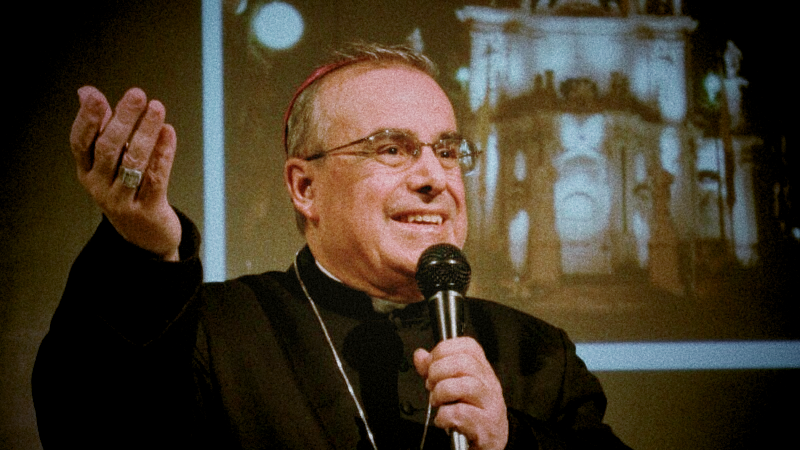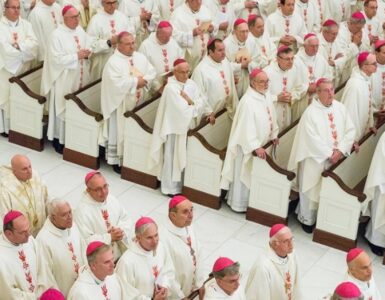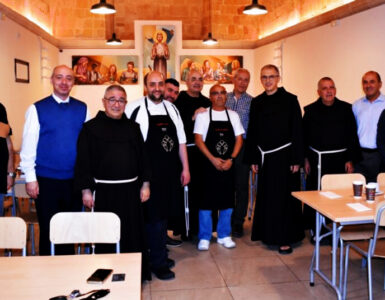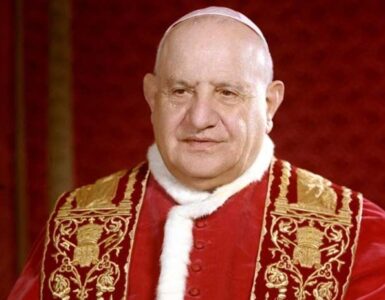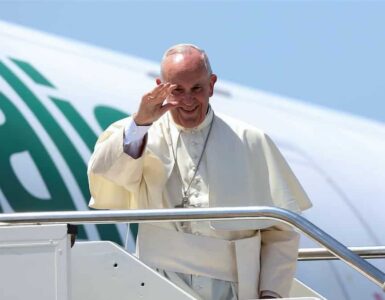On Tuesday 18 March 2025 Malta lost one of its greatest Church leaders, Mgr Paul Cremona OP, at the age of 79 years in Mater Dei Hospital. He served as archbishop between 2007 and 2014.
Archbishop Emeritus Paul Cremona was born in Valletta on January 25, 1946. He finished his primary education at the Montessori school in Valletta and then pursued the secondary level at the Lyceum in Ħamrun. In September 1962, he joined the Dominican Order and professed on September 29, 1963. Mgr Cremona studied philosophy and theology at the College of St Thomas Aquinas at the Dominican Priory at Rabat and was ordained priest on March 22, 1969. Following his priestly ordination, Mgr Cremona was sent to follow higher studies in Moral Theology at the Pontifical University of St Thomas Aquinas in Rome (Angelicum) where, in 1973, he graduated Doctor in Theology presenting the thesis The Concept of Peace in Pope John XXIII.
Between 1974 and 1980 he was prior at the priory of Our Lady of the Grotto at Rabat. He was re-elected to the same office in 1997 and again served two terms up to 2003. In 1981 he was chosen Provincial of the Maltese Dominican Province, an office he held for two four-year terms. When he finished from his office, he was entrusted with the parish of Our Lady of the Rosary of Fatima in Gwardamanġa as its parish priest. Then, between 1993 and 1997 he was responsible for the formation of the Dominican novices and students at Rabat, an office he again held for a short period of one year between 2004 and 2005.
In 2005 Mgr Cremona was chosen as Parish Priest of the Parish of Jesus of Nazareth in Sliema. His nomination as Archbishop of Malta was made public on December 2, 2006, and he was ordained Bishop on January 26. Archbishop Cremona also served the Archdiocese as the Archbishop’s Delegate for Consecrated Life, Assistant Spiritual Director at the Seminary at Tal-Virtù and as member of the Presbyteral Council. He was also President of the Council of Maltese Religious Major Superiors. Mgr Cremona wrote several books about theology and spirituality including The Church: Icon of the Holy Trinity and writings on the creed and the commandments, together with four books he co-authored with Fr George Frendo OP, today Archbishop Emeritus of Tirana-Durres, Albania. Pope Francis accepted the resignation of Mgr Cremona as Archbishop of Malta on October 18, 2014. Archbishop Cremona initially spent his retirement at the Dominican Friary in Rabat, Malta, before relocating to Id-Dar tal-Kleru in Birkirkara in more recent years. In 2019 Archbishop Cremona marked 50 years since his ordination to the ministerial priesthood.
Archbishop Charles Scicluna expressed deep sorrow over the death of his predecessor. He said that the Church entrusted such a faithful and loving pastor to the mercy of the Good Shepherd. Archbishop Scicluna also announced Mgr’s passing away on X (formerly Twitter) early on Wednesday as we were celebrating the feast of St Joseph.He said: The Church in Malta mourns the demise of our beloved Archbishop Emeritus Paul Cremona OP (1946-2025) and commends such a faithful and loving pastor to the mercy of the Good Shepherd. May he rest in peace,” Scicluna said on X. During St Joseph’s day, the present Archbishop shared a video message where he said the news of Mgr Cremona’s death presented “us the opportunity to pay tribute to a good shepherd, a humble and wise man who gave his life for our people, as the Archbishop of Malta.Archbishop Scicluna sad that Mgr Cremona was a religious priest as well as a Dominican friar, and this heritage of consecrated life and preaching was, furthermore,the seal of his ministry as Malta’s Archbishop. He said: He was a man close to our people. In him, our people saw a friendly face, a shepherd who gave his life to the flock. May he rest in peace.
Upon hearing these words immediately come into my mind what we find written in The Book of Constitutions and Ordinations of the Brothers of the Order of Preachers, precisely in The Fundamental Constitution:
The Order of Friars Preachers, founded by St Dominic, ‘is known to have been established, from the beginning, for preaching and the salvation of souls, specifically.’ Our brothers, therefore, as the founder prescribed, ‘should everywhere behave uprightly and religiously, as men intent on procuring their own and other people’s salvation; they should behave as gospel men, following in the footsteps of the Saviour, speaking to God or of God, among themselves or with their neighbours.’… Having been made cooperators with the episcopal order by priestly ordination, we have as our special function a prophetic task, which is to proclaim everywhere by word and example the Gospel of Jesus Christ, taking into account people’s situations, the times and the locations. The object of our preaching is either to cause the faith to be born, or to allow it to penetrate people’s entire lives more deeply, thus building the Body of Christ which is brought to perfection by the sacraments of faith (II, V).
Drawing from the infinite source of love, Jesus Christ, Mgr Paul Cremona deeply lived what St Paul wrote in his letter to the Colossians: Put on then, as God’s chosen ones, holy and beloved, compassion, kindness, lowliness, meekness, and patience, forbearing one another and, if one has a complaint against another, forgiving each other; as the Lord has forgiven you, so you also must forgive. And above all these put on love, which binds everything together in perfect harmony. And let the peace of Christ rule in your hearts, to which indeed you were called in the one body. And be thankful (Col 3:12-15).
Even Maltese civil authorities expressed their heartfelt appreciation for this great man of God and the Church. President Myriam Spiteri Debono said Mgr Cremona had let the Church in Malta with love and humility. She said: He will be remembered for the good that he carried out in silence during more than 50 years of service to the Church.The Prime Minister of Malta, Robert Abela, said in a Facebook post that the State as well as the Church will organise Mgr Cremona’s funeral. He said he had offered Mgr Scicluna condolences on behalf of the Maltese people, referring to the late bishop as a kind-hearted priest who led the Church with humility and love. Opposition leader Bernard Grech said the Maltese people lost someone who did lots of good through his kind words and by leading by example. He recalled the kind smile Mgr Cremona was known for, adding that when he last visited him a few days ago, he offered some wise and loving words.
Marco, his nephew, described his uncle as dedicated, warm-hearted and loving till the very end. RIP uncle Paul. You will be sorely missed. In a Facebook post, European Parliament president Roberta Metsola said Mgr Cremona was a man of the people. She thanked him for dedicating his life to helping others, adding he most often did so quietly without blowing any trumpets. This great comment amply reminds me of what Jesus tells us in the Gospel: But when you give alms, do not let your left hand know what your right hand is doing, so that your alms may be in secret; and your Father who sees in secret will reward you (Matt 6:3-4).
Speaker Anġlu Farrugia also expressed deep sorrow on behalf of the House of Representatives. In his statement Speaker Farrugia said: His lifelong dedication to faith, charity, and the Maltese community will leave an indelible legacy. Heartfelt condolences are extended to his family and the Archdiocese of Malta. The PL and PN conveyed their condolences to Mgr Cremona’s relatives in different statements. The PL said the archbishop emeritus “distinguished himself for being humble, for endorsing social values and for the work carried out in silence among the most vulnerable. He was a man of the people, both when he was a priest in various parishes and also when he was at the helm of the Archdiocese of Malta. On the other hand, the PN said the late bishop dedicated his life to the community. His humility, the love he radiated, and his warm smile will remain in the hearts of all who knew him or worked closely with him.These were also the defining characteristics of his leadership at the helm of the Church in Malta.
During the Mass of the episcopal ordination of Mgr Guido Marini, Bishop of Tortona and Mgr Andrés Gabriel Ferrada Moreira, secretary of the Congregation for the Clergy, on 17 October 2021, Pope Francis told them: Indeed, episcopacy is the name of a service, not of an honour, since the bishop must strive to serve rather than to rule, according to the Master’s commandment: “whoever would be great among you must be your servant, and whoever would be first among you must be slave of all” (Lk 22: 26). And by this service you will uphold your vocation and be true shepherds in serving, not in honours, in power, in might. No, to serve, always to serve… Closeness, with two accompanying traits: a closeness that is compassion and tenderness. Please, do not leave aside this closeness, come closer to the people, come closer to God, come closer to your brother bishops, come closer to the priests. These are the four forms of closeness of the bishop. The bishop is a man close to God in prayer. Very often one might say: “I have so much to do that I can’t pray. Stop. When the apostles “invented” deacons, what does Peter say? “But we will devote ourselves to prayer and to the ministry of the word”. The first task of the bishop is to pray – not like a parrot – to pray with the heart, to pray. “I don’t have time”. No! Take away other things, but prayer is the first task of the bishop. Closeness to God in prayer. Then, the second form of closeness, closeness to the other bishops. “No, because those belong to that party, I belong to this party…”. Be bishops! There will be arguments between you, but as brothers, close to one another. Never speak badly of your brother bishops, never. Closeness to the bishops: the second form of closeness, to the episcopal body. The third form of closeness is closeness to priests. Please, do not forget that the priests are the closest of the close. Very often we hear complaints, that a priest says: “I called the bishop but the secretary told me his diary is full, that perhaps, within thirty days, he might be able to see me…”. This is not good enough. If you find out that a priest has called, call him the same day or the day after. And with this, he will know he has a father. Closeness to the priests, and if they do not come to you, go to them: closeness. And the fourth form of closeness, closeness to the holy people of God. As Paul said to Timothy: “Remember your grandmother and your mother” (cf. 2 Tim 1:5). Do not forget that you have been “taken from the flock”, not as a member of an élite that has studied, that has many qualifications and who must be a bishop. No, by the flock. Please, do not forget these four forms of closeness: closeness to God in prayer, closeness to bishops in the episcopal body, closeness to priests, and closeness to the flock. May the Lord let you grow on this path of closeness, so that you will better imitate the Lord, because he has always been and is near to us, and with his closeness that is compassionate and tender he leads us forward.
This has been the holy life of Mgr Paul Cremona OP, Emeritus Archbishop of Malta, the Dominican friary who left a deep healing imprint in the lives of us Maltese people.


